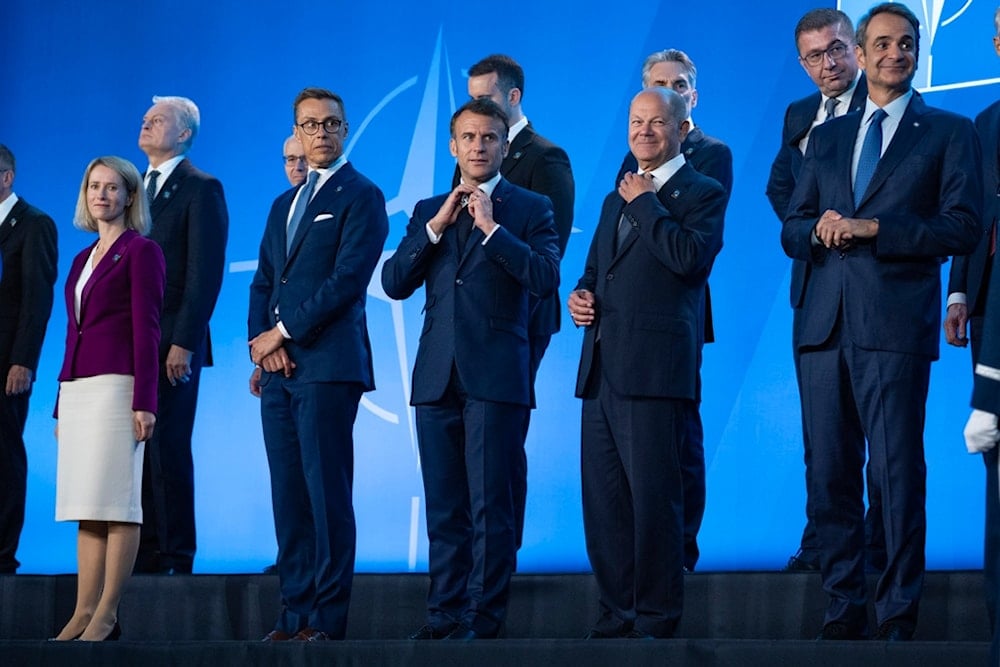NATO official urges members to spend more on defense
A senior NATO official underlines that member states must up their spending to over 2% in light of recent events.
-

French President Emmanuel Macron and German Chancellor Olaf Scholz adjust their ties before a family photo at the NATO Summit, Wednesday, July 10, 2024, in Washington, the United States. (AP)
In light of current global security challenges, NATO members must significantly increase their defense spending beyond the agreed target of 2% of gross domestic product (GDP), according to NATO Assistant Secretary General for Defense Policy and Planning Angus Lapsley.
Speaking to Defense One, Lapsley emphasized that the existing "threat scenarios" necessitate a substantial rise in defense budgets for the majority of NATO's European members.
"Given the threat scenarios that we face today, for most European allies, spending will have to rise considerably above the 2-percent floor if they're going to deliver the increases in capability and the better, usable, sustainable capability that we're asking them for," Lapsley said.
The push for increased defense spending aligns with calls from US Republican presidential candidate Donald Trump, who has stated that if elected, he would advocate for NATO member states to allocate at least 3% of their GDP to defense.
While NATO allies have committed to the 2% GDP target, many have yet to meet this benchmark. Currently, out of the 32 member states, only the United States, Poland, Estonia, Latvia, and Greece spend over 3% of their GDP on defense.
Lapsley expressed confidence that NATO members have the capacity to reach the 3% target, reflecting growing concerns about global security and the need for enhanced military capabilities within the alliance.
NATO bracing for Trump win
Back in July, ahead of the alliance's 75th anniversary, NATO leaders prepared to meet up in Washington with hopes of showing a united and strong front amid shaky grounds with the United States as the future remains uncertain in light of the ongoing war in Ukraine.
The summit, marked by anxiety from the US' allies, reflects the political uncertainties on both sides of the Atlantic; European allies are particularly uneasy about the potential return of former US President Donald Trump.
During his first term, Trump was critical of NATO, and his possible reelection raises questions about the future US commitment to the alliance. "Trump repeatedly voiced his antipathy to NATO in his first term, and in the most recent debate declined to say whether he would pull the United States out of the alliance," the Washington Post said.
European diplomats, meanwhile, are bracing for various scenarios, fearing that Trump might weaken US support for NATO and undermine the front that they have been seeking to paint as united despite many intra-alliance differences.
The current US election cycle is also causing concern. Sergey Radchenko, a historian at Johns Hopkins School of Advanced International Studies, expressed on social media, "This election is doing more to discredit American democracy than [Russian President] Vladimir Putin and [Chinese President] Xi Jinping could ever hope to."
In Europe, the rise of populist and far-right factions adds to the political tension as they gained traction in recent elections.
Josh Rogin of The Washington Post noted, "With Trump's possible return looming, the best way to ensure Ukraine's long-term security is to give Ukraine more capability to actually defeat Russia." This includes providing air defense systems, fighter jets, and longer-range rockets.
NATO Secretary-General-elect, Dutch Prime Minister Mark Rutte, urged his European colleagues to adapt to political changes in Washington, saying, "We should stop moaning and whining and nagging about Trump."

 3 Min Read
3 Min Read








